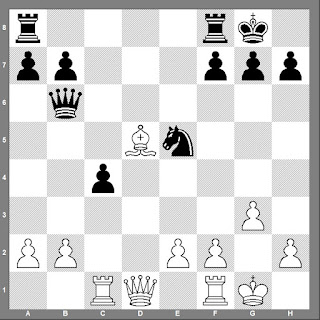Albert Becker (left) vs.
Paul Keres, 1936. Credit:
Wikipedia.
We have noted in this blog before how the Palestinian (Jewish) team in 1939 naturally refused to play with the German team, and that this cause a serious problem until Grau "saved the day." Porat's eyewitness account was reported here.
Porat said that the Palestine team was "not invited to the negotiations" and that "the organizers notified us that the German team objected with the claim that Palestine, as a Mandate, is not in a state of war with Germany, so they see no reason to cancel the match!"
The master's thesis noted in the previous post (see there for credits) sheds more light on the matter. It refers to a letter from the captain of the German team, Becker, to Max Bluemich, originally posted online by Chessbase in 2008. In it, Becker does indeed inform Blumlich that the German team claimed Palestine "is not a British colony, but a League of Nations mandate" and therefore formally not in war with Germany.
It is clear from Becker's letter that the real reason for his objection is that a 2:2 draw without play with Palestine would benefit other teams (esp. Argentina) which could expect a better result by playing the relatively weak Palestinian team. What is also clear, and more surprising, is that Becker notes "The Jews [i.e., Palestinian team] came with the Argentinians to our apartment to appeal to our sense of sportsmanship" to convince Becker to agree to the 2:2 draw!
Porat does not mention any such meeting in his recollections. It may be that he was not part of it, or that he wished to hide any such informal connection with the German team. It is clear, from Becker's letter, that the Palestinian team would not have played the German team under any circumstances.
Another interesting point, also mentioned in the letter and pointed out in the master's thesis, is that Becker complained that Alekhine, the French team's captain (and of course world champion) was very much against the German team, and forbade "his people" from any contact with them - with the absurd result that the Palestinian Jews came to talk with Becker while Alekhine and the French did not.
Does this prove Alekhine was not an antisemite? It depends on his motives. He could have been opportunistically trying to harm Germany for the benefit of France's chess team. He could have been angry at Germany's aggression and boycotted the Germans out of principle. Or he could have done so out of protest at the German treatment of the Jews.
The latter two motives, given Alekhine's later behavior, seem unlikely. But this behavior does support the claim that Alekhine, while an opportunist, was not actually devoted to Nazism - or for any other ideology for that matter - but rather would do whatever he thought would benefit him at the time.
But how could the Jewish team come to meet a man who ended his letter with "Heil Hitler"? It seems that Becker was no fanatical Nazi. Like all of the rest of the German team, he remained in Argentina during the war. Nothing in his biography suggests particular Nazi sympathies. But he was writing in 1939 to a man who was an ideological Nazi, and the "Heil Hitler" signature was more or less compulsory in such situations.





























.jpg)



















